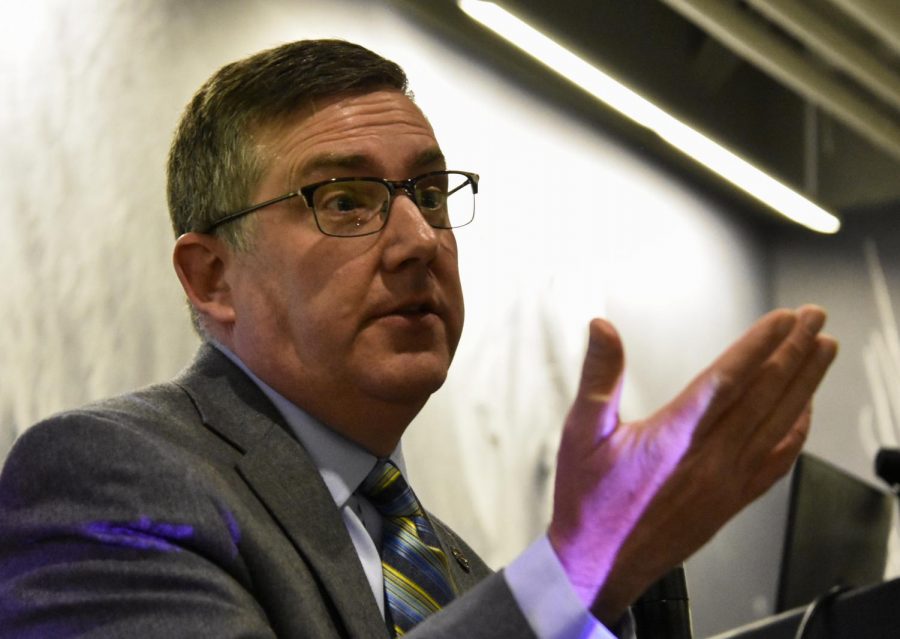GPSA talks budget with Schulz
Schulz discusses ‘Drive to 25,’ WSU athletics deficit with grad, professional students
BONNIE JAMES | DAILY EVERGREEN FILE
WSU President Kirk Schulz will serve Pac‑12 Conference representative to the College Football Playoff board of managers.
April 9, 2018
Graduate and professional students questioned university leadership about WSU’s spending on athletics, identity theft and technology when WSU President Kirk Schulz attended GPSA’s regular Senate meeting Monday.
Schulz said he is hopeful for the next year because he is starting to become better acquainted with donors.
“I really expect in year three for some of our fundraising efforts to take the next step,” he said.
Schulz also addressed activism on campus, saying when there is a problem at the university, many groups try to pressure him into rapid change and don’t give him enough time to consult all of the groups on campus before making decisions.
“It turns out, to have any systemic change,” he said, “you have to involve other people.”
GPSA President-elect Amir Gilmore asked Schulz to explain the importance of graduate students. Schulz said a lot of people seem to not actually know what graduate students do at WSU. He described how they manage labs, teach, research and serve as the right hand to faculty. Schulz said he is working on highlighting graduate student issues by publicizing what they do on a daily basis.
“Grad students are a critical part of our enterprise here,” Schulz said.
Schulz also emphasized his “Drive to 25” initiative, saying it’s an effort to improve WSU’s reputation. He said when he spoke to executives at Microsoft, they said they often consider graduates from other universities before WSU students because the university is not highly ranked.
“I think the ‘Drive to 25’ affects graduate students almost as much as everyone else,” Schulz said.
He said graduate students here need to work hard toward building the university’s reputation.
“That’s your job,” Schulz said, “all of you.”
GPSA President Shane Reynolds asked Schulz if there is a plan to eliminate WSU Athletic Department’s dependency on university reserves.
Schulz said that although Athletics was running on a deficit of $13 million a year in the past, it is now down to $8 million.
“Everyone seems to forget we have made substantial progress forward,” he said.
Schulz said this coming August, WSU administrators will start formulating a new plan to reduce that $8 million down to $0. Athletic Director Patrick Chun came to WSU with a background in fundraising and philanthropy, which Schulz said will help with getting the department completely in the black.
Another concern he brought up is how difficult it is for the university to determine how much to pay individual coaches.
“Is paying a coach $1 million, $4 million, $10 million worth it?” Schulz said. “You can argue that point until the cows come home.”
Schulz said the ideal athletics program supports the university’s mission, is balanced and isn’t a drain. In the past, athletics has been seen as distant from the rest of the university, he said, but he hopes Chun will bring it closer.
Gilmore said he is excited about the search for a new associate vice president and asked Schulz what he thought about it. Schulz said he is weary of the search process that goes into hiring new AVPs, but he thinks he is close to having a solid staff.
“I’m excited about the quality of the candidates,” he said.
Schulz also brought up new technology WSU is using. He said officials are working on using online streaming to bring forums to the community. In the case of his State of the University address, he said, there were just as many people watching online as there were in the live audience.
“I think if it’s not available online, they don’t come,” Schulz said.
Gilmore asked Schulz about the university’s plan to prevent students from becoming victims of fraud and identity theft. He said the university is often a target because private information is available on the myWSU portal.
Schulz said he was unsure about the specific case, but the university is focusing on education about fraudulent phishing emails. He said he encourages people to change their passwords often.
“Attacks on our system are going to happen,” Schulz said. “They’re not going to slow down.”
Schulz also addressed the stipend cuts to graduate student positions, which happened last semester in response to his university-wide 2.5 percent spending reduction. Graduate students were able to avoid the cut after the reduction was backfilled with the president’s budget and outside funding.
Schulz said stipends are low at WSU, and the university should do better. He also encouraged graduate students to contribute to their former programs after leaving WSU.
Also at the meeting, GPSA senators passed the increase in the mandatory student transit fee. The increase of $1.63 per semester needs to go through both ASWSU and GPSA in order to pass.








